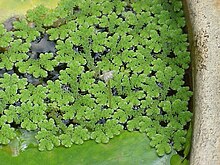满江红属
外观
| 满江红属 | |
|---|---|

| |
| Azolla caroliniana | |
| 科学分类 | |
| 界: | 植物界 Plantae |
| 演化支: | 维管植物 Tracheophyta |
| 纲: | 真蕨纲 Polypodiopsida |
| 目: | 槐叶𬞟目 Salviniales |
| 科: | 槐叶苹科 Salviniaceae |
| 属: | 满江红属 Azolla Lam., 1783[1] |
| 模式种 | |
| A. filiculoides[1] | |
满江红属(学名:Azolla)是槐叶苹科(原属满江红科)的一个属,现存七种真蕨类漂浮性水生植物,看起来并不像蕨类而更像浮萍[2]。该属的植物在一些地区是入侵植物[3]。
属名Azolla源于希腊语azo(使干燥)和ollyo(杀)的合成词,指本属植物容易被干旱环境影响而死亡。
种
[编辑]- Azolla cariniana
- Azolla imbricata
- Azolla nilotica Decne. ex Mett.
- Azolla pinnata R.Br.
- Azolla cristata Kaulf.
- Azolla filiculoides Lam.
- Azolla rubra R.Br.
此外还有一部分满江红属植物仅存在化石。
生态
[编辑]
满江红属植物繁殖速度极快,其生物量1.9天就能翻倍[8],鲜重每公顷达8至10吨,印度的羽叶满江红鲜重甚至能达到每公顷37.8吨[9]。满江红通常叶子漂浮在水上,根则垂入水中。
满江红和固氮蓝细菌Anabaena azollae存在体外共生关系:蓝细菌为满江红提供氮素,满江红为蓝细菌提供糖分。[10]固氮细菌会从一代满江红直接(“纵向”)传到下一代。固氮细菌在共生关系中失去了不少基因,所以不能离开满江红在野外生存。通常限制满江红生长的营养素是磷。如果水体获得了大量的磷(例如通过富营养化),那么满江红经常会爆发式地生长。[11]

满江红在东南亚和东亚是传统的生物肥料。在中国,当春天稻田淹水时,农民会种上满江红,使其覆盖水面、抑制杂菜。当水退去后,满江红很快就会死去,留下的植物组织逐渐腐烂释放出大量氮肥:每公顷每年最多可以提供九吨蛋白质。[12]
参考文献
[编辑]- ^ 1.0 1.1 In: Encyclopédie Méthodique, Botanique 1(1): 343. 1783. Name - Azolla Lam.. Tropicos. Saint Louis, Missouri: Missouri Botanical Garden. [February 19, 2010]. (原始内容存档于2012-10-19).
Annotation: a sp. nov. reference for Azolla filiculoides
Type Specimens HT: Azolla filiculoides - ^ Li, Fay-Wei; Brouwer, Paul; Carretero-Paulet, Lorenzo; Cheng, Shifeng; de Vries, Jan; Delaux, Pierre-Marc; Eily, Ariana; Koppers, Nils; Kuo, Li-Yaung. Fern genomes elucidate land plant evolution and cyanobacterial symbioses. Nature Plants. 2018-07-02, 4 (7): 460–472. ISSN 2055-0278. PMC 6786969
 . PMID 29967517. doi:10.1038/s41477-018-0188-8 (英语).
. PMID 29967517. doi:10.1038/s41477-018-0188-8 (英语).
- ^ Weber, Ewald. Invasive Plant Species of the World: A Reference Guide to Environmental Weeds. 2017: 65 [2021-12-09]. (原始内容存档于2021-12-16).
- ^ Evrard, C.; Van Hove, C. Taxonomy of the American Azolla species (Azollaceae): A critical review. Systematics and Geography of Plants. 2004, 74: 301–318.
- ^ Name - Azolla Lam. subordinate taxa. Tropicos. Saint Louis, Missouri: Missouri Botanical Garden. [February 19, 2010]. (原始内容存档于2013-01-08).
- ^ Query Results for Genus Azolla. IPNI. [February 19, 2010]. (原始内容存档于2017-08-15).
- ^ Hussner, A. NOBANIS -- Invasive Alien Species Fact Sheet -- Azolla filiculoides (PDF). Online Database of the North European and Baltic Network on Invasive Alien Species. Heinrich Heine Universität, Düsseldorf. 2006 [February 19, 2010]. (原始内容存档 (PDF)于2013-01-08).
- ^ Iwao Watanabe, Nilda S.Berja. The growth of four species of Azolla as affected by temperature. Aquatic Botany. 1983, 15 (2): 175–185. doi:10.1016/0304-3770(83)90027-X.
- ^ Hasan, M. R. ; Chakrabarti, R., 2009. Use of algae and aquatic macrophytes as feed in small-scale aquaculture: A review. FAO Fisheries and Aquaculture technical paper, 531. FAO, Rome, Italy. fao.org/. [18 August 2014]. (原始内容存档于2019-01-09).
- ^ Ran, L.; Larsson, J.; Vigil-Stenman, T.; Nylander, J. A.; Ininbergs, K.; Zheng, W. W.; Lapidus, A.; Lowry, S.; Haselkorn, R.; Bergman, B. Genome Erosion in a Nitrogen-Fixing Vertically Transmitted Endosymbiotic Multicellular Cyanobacterium. PLOS ONE. 2010, 5 (7): e11486. Bibcode:2010PLoSO...511486R. PMC 2900214
 . PMID 20628610. doi:10.1371/journal.pone.0011486
. PMID 20628610. doi:10.1371/journal.pone.0011486  .
.
- ^ The Geological Society of London - The Arctic Azolla event. www.geolsoc.org.uk.
- ^ FAO figures.
